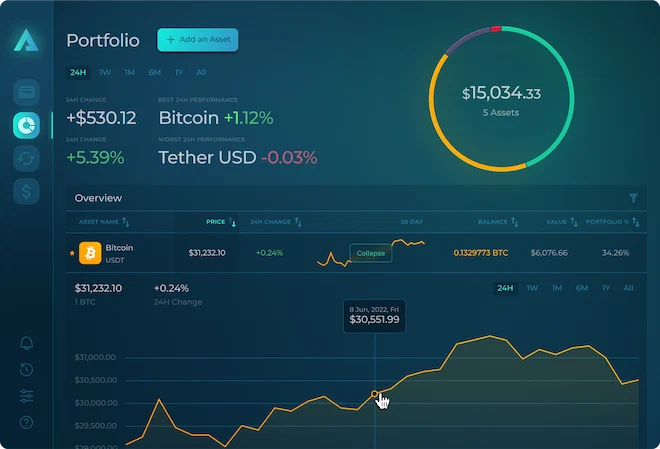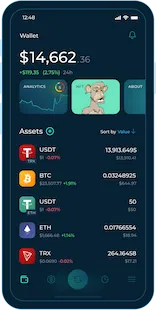How to Read Candlestick Cryptocurrency Charts
Nov 27, 2022How do people who trade know when to buy a cryptocurrency and when to sell it? How do you know if it's the right time to buy Bitcoin today or when it's that moment to trade your Dogecoins for cash?
Reading candlestick charts is the very basics of cryptocurrency technical analysis to get a better understanding of what's going on in the market today, during weeks, months, and years. That helps you to trade successfully.
Here's an intro to technical analysis by the Arctic Wallet team. Learn to read crypto candlestick charts here and now!
Understanding Candlestick Charts
Even when the crypto market seems to be in chaos, markets always move in patterns. Knowing these patterns can help you make rational trading decisions and predict price movement trajectories on daily, monthly, or yearly frames.
What is a candlestick chart?
First off, where to find candlestick charts? TradingView.com is considered the best free platform to monitor live cryptocurrency price action.
A Candlestick chart is a graphical representation of cryptocurrency price movements within a specified timeframe: one minute, day, week, month, and year. Each of these is indicated in one candle.
This one is extremely helpful for all who trade, be it stock candlestick charts or crypto candle charts. This method is also called Japanese candlesticks charting as it was originally invented by a Japanese trader back in the 18th century, and still proves to be a highly effective technical analysis tool.
In the example below, each candle displays BTC price change in a month 👇
| Monthly Bitcoin Candlestick Chart - Source: TradingView |
Interpreting a candle on a candlestick chart
One candlestick consists of:
A body. A green or red rectangle that shows at what price level the day/month/year started (open), and ended (close) within a selected timeframe.
Wicks. Straight lines show the highest and lowest prices within the period. Wicks may not be seen if closing and opening prices coincide with the highest and lowest prices.
Thus, one candle with a body and wicks shows the price range of an asset for the period you select. For example, a weekly candlestick sums up the multiple days of the movement in one candle.
| Candle Stick Formation / Source: CoinSwitch |
Types of candlesticks
There are generally two types of candles - green and red, also called bullish and bearish.
- The candle is considered bullish when the opening price is lower than the closing, essentially, displaying an upward movement.
- Vice versa, a bearish candlestick opens higher than it closes and shows the downward movement of a price.
The length of each candle shows how much value an asset gained or lost. The longer the body, the more pressure to buy or sell market participants meet within a given time
How do you Analyze Candlesticks?
Finding Support and Resistance levels
Support and resistance lines help to find entry and exit points.
| Source: Phemex |
Support and resistance levels are drawn at points where the line would make two touches or more at their lower and higher points in daily, weekly, monthly, or yearly charts.
As market participants trade based on emotions of fear or greed, these are also called psychological support and resistance levels.
At a resistance line, as a rule, prices stop growing: they move up to that point and get rejected. At this point, the value will bounce back down at a higher chance. This is where traders usually sell.
A support line is a bottom level where prices generally stop falling, meaning buyers come in and push the prices up. This pint may be a good moment to buy.
If you want to trade daily, use short-term intervals to close profitable deals. From a long-time perspective, zoom out for monthly support and resistances.
Identifying trends
Candlesticks charting can assist in identifying short-term and longer-term trends. Trendlines are drawn across two or more touches on resistance and support levels of smaller ranges.
| Upward Bitcoin Trend breakdown / Source: IBTimes |
What candlestick charts don't tell
Candle-based charts lack a comprehensive breakdown of movements; they only show the range.
Conclusion
Using candlestick charts, we can identify how cryptocurrency prices are moving to trade successfully. Crypto chart patterns will help find the best time to buy cryptocurrencies or sell for profit. One important thing to note, though: crypto chart signals do not guarantee things will go as should. Plus, add cognitive bias when analyzing ones. However, knowing how to read cryptocurrency charts will help you navigate the market based on analysis rather than emotions and gut instincts.
Stay tuned to our blog for more technical analysis content!


